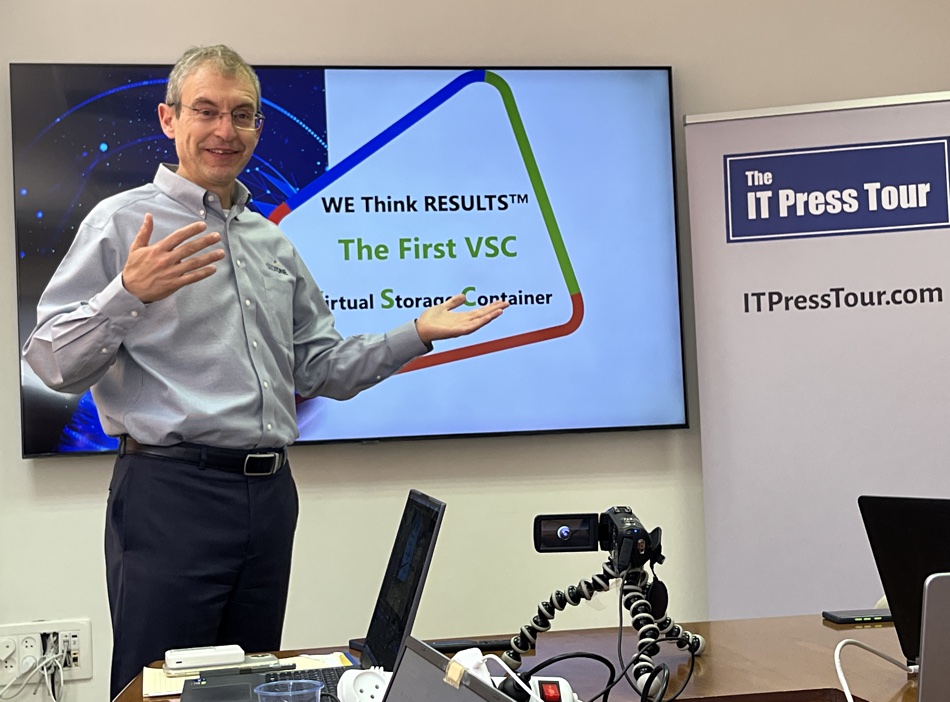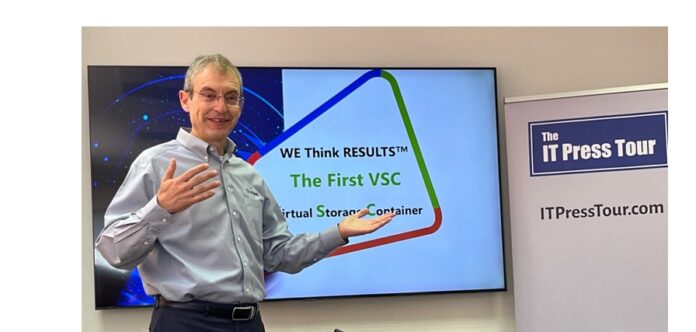Gal Naor, StorONE co-founder and CEO, claims the company is growing “very fast” and he wants an IPO, possibly within two years.
Naor was a joint founder of Storwize, the real-time compression storage software company started up in 2004 and acquired by IBM in 2010 for $140 million. As Storwize raised $38 million in funding, it was a successful exit. Naor started up StorOne as its CEO with CTO Raz Gordon the following year, 2011, and raised $30 million in funding in 2012.
The sales pitch was to remove inefficiencies from the storage software stack and produce array software that could provision file, block and object storage from the same underlying drives, delivering near full IO speed from the drives without being locked in to any class or capacity of drive type. The product was delivered eight years later.

Now, at an IT Press Tour briefing in Tel Aviv, Naor said the company was “cash-flow positive.” Ultimately, the aim for the company will be to demonstrate another six or more cash flow-positive quarters, however, after which it could potentially IPO. The time is not right for an IPO, Naor said. Why? Because it’s only just scored cash flow positivity, he told us, and the world is facing general economic problems stemming from COVID, the Ukraine-Russia war, bank problems and so forth. These factors could change by 2025 and then an IPO might be a more realistic prospect.
StorONE doesn’t seem to have burnt through very much VC cash, with its tech announcements and performance announcements relatively low key.
Why does StorONE think customers are buying its product? From its point of view, the key differentiator is its storage software, the ONE storage engine, a hypervisor that it makes better use of a server’s compute and memory resources and of the attached disks and solid state drives than other, legacy, storage software systems. Naor said it represents a completion of the virtualization of computer systems started by VMware (virtual machines) and SDN (software-defined networking).
It is a single all-in-one storage provisioning and managing system with block, file and object access protocols to virtual storage containers. StorONE is basically an abstracting storage entity which hides the details of storage drives and their protection from client applications and provides a single storage silo. It treats all drives as the same in that it can include different capacity drives in its virtual RAID (vRAID) system. It also supports tiering to different drive classes but does not support data reduction. That’s because drive capacity these days is cheap enough for it not to be needed, unlike the time when Storwize was being developed when drive capacity was limited and expensive.
StorONE protects its data with immutable snapshots, millions of them, providing a highly granular rollback capability. It also monitors snapshot creation rates and if these spike, perhaps due to a ransomware attack, then this is detected and alerts dispatched.
Because its software is so efficient, Naor said, StorONE gets more performance from storage drives, in IOPs terms, than competing software, he claims. That lowers its costs to customers, who buy its software based on the number of drives it manages, not the amount of capacity it provides.
He told us customers buy StorONE software for one workload, and then find it is fast enough and economical in its use of host server resources that it can run other workloads as well – the classic land-and-expand idea. However, Naor would not say how many customers are using StorONE’s software, nor its revenue growth rate, average capacity managed or any other statistic that might provide a hint of actual revenue numbers.
StorONE’s strategy is to be the single storage engine needed by its customers. As they adopt bigger drives so too does StorONE. As they embrace the public cloud so too does StorONE. It runs on Azure and is available in Azure’s marketplace. Its software runs on AWS but that has not been publicly announced as available, and we understand the same is true for the Google Cloud Platform.
Customers are embracing cloud-native software development using Kubernetes and StorONE has a CSI driver.
The company has five offices and concentrated its sales growth efforts in the US. It’s now broadening that to focus more on Europe and Asia, using channel partners. It has recruited certified ethical hacker Jeff Lamoche to be its chief product evangelist and in two months he’s created five white papers and started running ransomware recovery workshops on StorONE’s capabilities.
We think StorONE’s progress is accelerating and its relative under-the-radar approach is changing. Think if it as a supplier of super-efficient Ceph-like storage that fulfils pretty much any general enterprise storage requirement.








